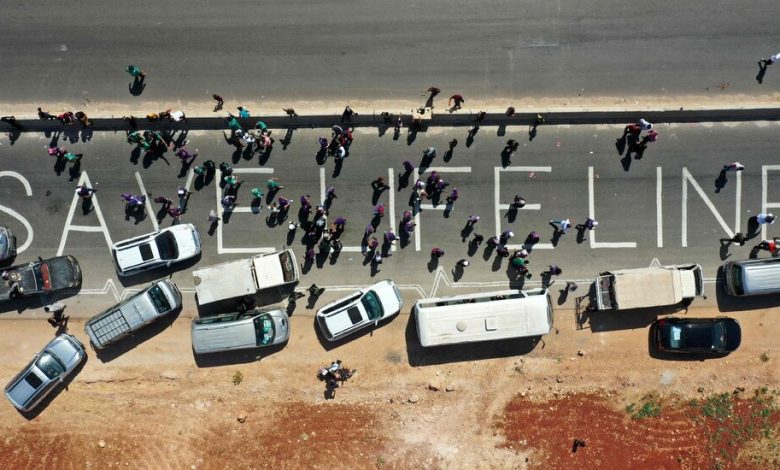Humanitarian Aid to Syria Is Imperiled After Vetoes in U.N. Security Council

The United Nations Security Council on Tuesday failed to adopt two rival resolutions to extend cross-border aid deliveries into northern Syria from Turkey, effectively cutting off a vital lifeline to about 4.1 million people in opposition-held territories.
Russia vetoed a bid put forth by Brazil and Switzerland to extend one resolution for nine months, a compromise from an initial 12-month extension called for by the United Nations and international aid agencies. A second resolution put forth by Russia for a six-month extension was vetoed by Britain, France and the United States. Russia and China voted in favor, and the 10 other Council members abstained.
Vassily Nebenzia, Russia’s ambassador to the United Nations, told the Council that the aid would go to “terrorists” and that the cross-border mechanism was a “show.”
“If our draft is not supported, then we can just go ahead and close down the cross-border mechanism,” Mr. Nebenzia said.
Linda Thomas-Greenfield, the U.S. ambassador to the United Nations, said that failing to adopt both resolutions had been a “sad moment” and that Russia had acted like “a bully in the playground: My way or the highway.”
She said that the United States was committed to reauthorizing cross-border aid deliveries but that it could not, “in good conscience, support the text that Russia forced upon this Council.”
“Russia’s resolution failed to ensure that aid would continue to reach the Syrian people during the cold winter months,” Ms. Thomas-Greenfield added.
Negotiations continued behind closed doors to find a way through, diplomats said, but the Russian ambassador cast a doubt on whether a compromise resolution could be reached by indicating that Russia would not agree to a straightforward renewal without some language about sanctions relief for Syria.
The U.N. aid operation from a crossing in Turkey known as Bab al-Hawa was authorized by the Security Council in 2014 to send food, medicine and other lifesaving assistance to Syrians living in areas controlled by the opposition.
The deadline for extending the aid operation expired on Monday, and without a Security Council mandate or permission from Syria’s government, the United Nations cannot legally cross an international border.
The United Nations said, however, that aid deliveries would continue through the Bab Al-Salam and Al-Ra’ee crossings in Turkey that were opened with the authorization of the Syrian government after the February earthquake. These two crossings have been extended until Aug. 13.
But about 85 percent of U.N. aid is delivered through Bab al-Hawa crossing, the world body said on Tuesday, and it would not be able to match that number through the other two border crossings.
Supplies have already been positioned in northern Syria, and while convoys cross from government checkpoints in Syria, they are not sufficient, the United Nations said.
International aid agencies and Human Rights Watch condemned Russia for vetoing the resolution, and called for diplomats to immediately regroup and reach a compromise.
“The Security Council’s failure to reauthorize U.N. cross-border aid into northwest Syria today will only add to the anxiety and uncertainty that Syrians living there are already enduring,” six international aid agencies, including CARE International and International Rescue Committee, said in a joint statement.
“Council Members should be guided by humanitarian needs rather than politics.”
